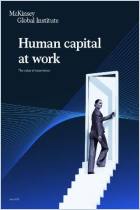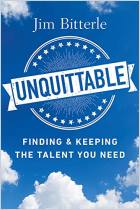
Stave Off Attrition with an Internal Talent Marketplace
McKinsey Talks Talent
Recommendation
Many of today’s top employees don’t just want a job; they want work that offers growth opportunities. Meanwhile, employers are struggling to fill talent gaps within their organizations. In this McKinsey Talks Talent podcast episode, host Lucia Rahilly speaks with McKinsey leaders Bryan Hancock, Bill Schaninger and Emily Field about how internal talent marketplaces powered by AI can help with these dilemmas. Internal talent marketplaces identify internal candidates who have skills that aren’t being utilized and give workers a chance to tackle new challenges without leaving their organizations.
Summary
About the Podcast
Lucia Rahilly is global editorial director and deputy publisher of McKinsey Global Publishing and host of the McKinsey Talks Talent podcast. Emily Field is a partner in McKinsey’s Seattle office; Bryan Hancock is a partner in the Washington, DC, office; and Bill Schaninger is a senior partner in the Philadelphia office.




















Comment on this summary